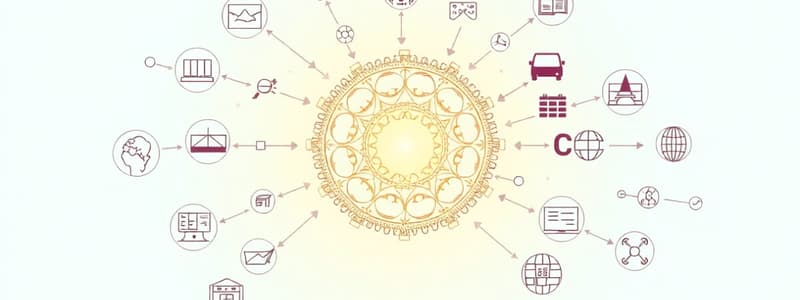Podcast
Questions and Answers
What does it mean to understand the self?
What does it mean to understand the self?
Having insights into one’s own behavior, attitudes, strengths, and weaknesses.
Who famously stated, 'I think therefore I am'?
Who famously stated, 'I think therefore I am'?
- Plato
- Immanuel Kant
- David Hume
- René Descartes (correct)
According to John Locke, personal identity depends on substance.
According to John Locke, personal identity depends on substance.
False (B)
The founder of Western philosophy is ______.
The founder of Western philosophy is ______.
Which of the following is NOT one of the tripartite classes in Plato's society?
Which of the following is NOT one of the tripartite classes in Plato's society?
What are the psychosexual stages of development?
What are the psychosexual stages of development?
Match the following terms with their definitions:
Match the following terms with their definitions:
Neuroticism is characterized by emotional stability.
Neuroticism is characterized by emotional stability.
What is heredity?
What is heredity?
Nutrition is essential for ______ and development.
Nutrition is essential for ______ and development.
Study Notes
Understanding The Self
- Socrates emphasized the importance of self-knowledge, stating that "without this work on yourself life is worthless."
- Plato also explored the concept of self, highlighting the importance of the "ideal self" or the "perfect self." He suggested societies have a tripartite class structure:
- Productive (workers/appetite)
- Protective (warriors/spirit)
- Governing (rulers/reason)
- St. Augustine a Christian theologian and Bishop of Hippo Regius, contributed significantly to the understanding of the self through his writings.
- Thomas Aquinas proposed the theory of self-knowledge, stating that we don't encounter ourselves in isolation but rather as agents interacting with our environment.
- René Descartes provided a famous philosophical statement: "I think therefore I am", emphasizing the importance of self-consciousness in understanding the self.
- David Hume believed that the self is a "bundle theory of mind," implying that the self is a collection of perceptions and experiences.
- Immanuel Kant focused on the importance of respecting the self, highlighting the two key components: inner and outer self.
- John Locke proposed the idea of "personal identity" which hinges on consciousness rather than substance.
Openness, Conscientiousness, Extroversion, Agreeableness, Neuroticism (OCEAN)
- Openness features characteristics like imagination, insight, and intellectual curiosity.
- Conscientiousness reflects individuals who are thoughtful, have good impulse control and are goal-oriented.
- Extroversion characterizes individuals who are sociable, talkative, assertive, and display high levels of emotional expressiveness.
- Agreeableness encompasses traits like trust, altruism, kindness, affection, and prosocial behavior.
- Neuroticism is associated with sadness, moodiness, and emotional instability.
The Self and The Family
- Relationships are defined as interactions between two or more people.
- Building trust is essential in relationships and is fostered by responsibility and freedom.
- Traditions are important because they provide a source of identity and are behaviors and activities repeated over time.
The Self and Society
- Society refers to an organized group of people with shared values and goals.
- Human beings are naturally social creatures and have a strong need for connection and belonging.
- Social life is a fundamental aspect of human existence, and we cannot live without interacting with others.
- G.H. Mead's Social Self theory posits that the self emerges from social interaction and develops through three activities: language, play, and games.
The Structure of Personality
- Freud's Psychoanalytic Theory:
- ID: The basic, instinctual part of the personality, driven by pleasure and immediate gratification.
- Ego: The rational and logical part of the personality, mediating between the desires of the id and the constraints of the superego.
- Super Ego: The moral component, responsible for internalizing societal rules and values.
Psychosexual Stages of Development (Freud)
- Oral Stage (0-18 months): Focus on oral gratification through sucking, biting, and chewing.
- Anal Stage (18 months-3 years): Focus on controlling bowel movements and toilet training.
- Phallic Stage (3-6 years): Focus on the genitals and sexual curiosity.
- Latency Stage (6 years- puberty): Sexual impulses are repressed and focus shifts towards social development.
- Genital Stage (puberty onward): Reawakening of sexual impulses and mature sexual relationships.
Psychosocial Development Theory (Erikson)
- Oral Sensory (0-1.5 years): Trust vs. Mistrust.
- Muscular-Anal (1.5-3 years): Autonomy vs. Shame and Doubt.
- Locomotor (3 - 5 years): Initiative vs. Guilt
- Latency (5 - 12 years): Industry vs. Inferiority
- Adolescence (12-18 years): Identity vs. Role Confusion
- Young Adulthood (18-25 years): Intimacy vs. Isolation
- Middle Adulthood(25-65 years): Generativity vs. Stagnation
- Maturity (65+ years): Ego Integrity vs. Despair
Growth, Development, and Maturation
- Growth: The process of physical maturation.
- Development: The process of functional and physiological maturation of an individual.
- Maturation: The completion of growth and development within an organism.
Childhood Stages
- Childhood: 1 year - 11 years
- Mid-Childhood: 6 years - 10 years
- Late Childhood: 10 years - 16 years
- Adolescence: 14 years - 20 years
Factors Affecting Growth and Development
- Heredity: Genetic information passed down from previous generations.
- Nutrition: Adequate nutrients are essential for growth and development.
- Exercise: Exercise increases bone diameter and density.
Sexuality and Gender Identity
- Lust: Driven by initial physical attraction and flirting.
- Attachment: A sense of calmness and stability felt with a long-term partner.
- Sexual Orientation: An individual's pattern of sexual attraction based on gender.
- Gender Identity: An individual's internal sense of being a man or woman.
- Gender Expression: How an individual expresses their masculinity, femininity, both, or neither through appearance and behavior.
Sexually Transmitted Diseases (STDs)
- HIV, hepatitis, painful sex, herpes, gonorrhea are common STDs.
Contraception
- Natural methods: Abstinence, withdrawal, calendar method.
- Artificial methods: Pills, condoms, implants, rings, patches, injections.
Religion
- Religion is a unified system of beliefs and practices concerning sacred things, including belief and ritual focused on supernatural beings.
Studying That Suits You
Use AI to generate personalized quizzes and flashcards to suit your learning preferences.
Related Documents
Description
This quiz explores key philosophical concepts of the self as discussed by influential thinkers like Socrates, Plato, and Descartes. Examine the tripartite structure proposed by Plato and dive into the contributions of Augustine and Hume on self-knowledge and self-consciousness. Challenge your understanding of these profound ideas that shape human identity.




